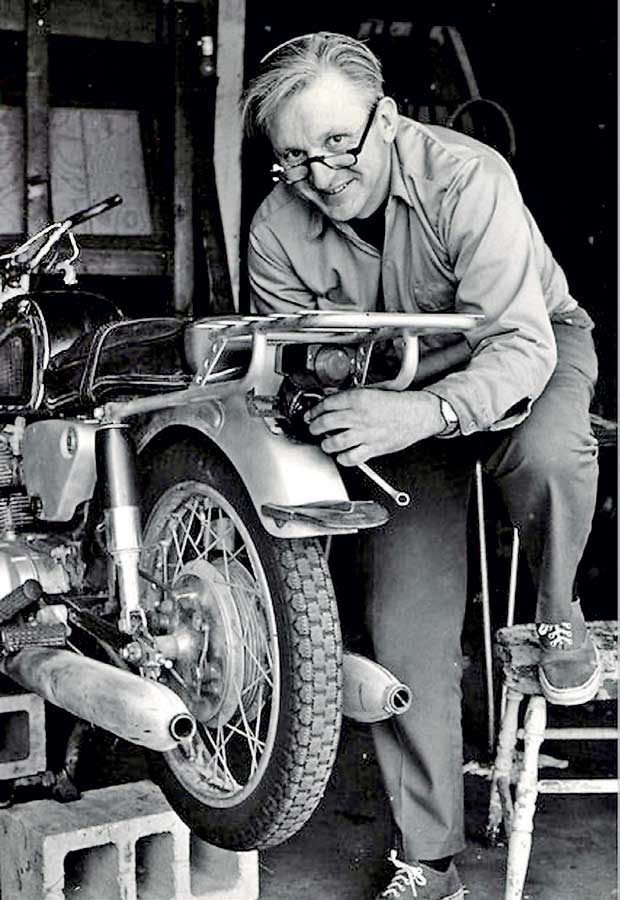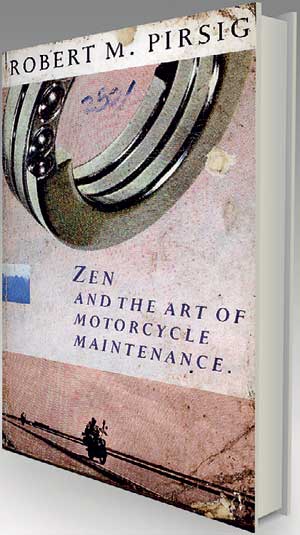Reply To:
Name - Reply Comment
Last Updated : 2024-04-23 22:35:00


Therefore, it comes as a delightful shock when you see the cover of a new edition of Robert M. Pirsig’s ‘Zen and the Art of Motorcycle Maintenance’ used as a graphic to illustrate a newspaper column, and that column starts with this paragraph: “It was in my teens that I first read Robert Pirsig’s ‘Zen and the Art of Motorcycle Maintenance’ and came face-to-face with his ‘law’ which states that ‘The number of hypotheses that can fit a given set of facts are infinite’.” 
The writer (Arjuna Seneviratne) says the statement was anathema to him as a budding math and science person. I’m weak in both areas, but I can agree wholeheartedly with Pirsig. I might add that, all in all, the above mentioned was the most interesting column I’ve read in a long, long time. To say the very least, it’s unusual in our newspaper journalism, where the focus is on daily issues, big or small. And today’s big becomes tomorrow’s trivia in the dustbin of history.
When the writer says, ‘If a review is done of the sum total of human effort in the last century or so, I have to affirm that most of the things that actually eased the burden of life on people were things created by people who never saw the insides of a university.’ I can agree with that, and that’s a statement which can be proven statistically.
"If one ventures to make a list of 100 of the world’s most creative and innovative minds, it’s a safe bet that most of them would be without university backgrounds"
Universities are fantastic places, or they should be. When a friend first took me to the University of  Peradeniya in the mid 80s, I was captivated, though its glory days were by then long gone. My geography teacher, a Pera graduate and a romantic lucky enough to have studied there in the tumultuous, momentous 1950s, spoke of the place with awe and longing. I loved the setting, the aura, the history and the legends of Peradeniya, and you could without doubt meet many interesting people there; but nothing would compel me to get bogged down in academia, and it isn’t just my fear and loathing of ragging. It may be that I have lost something thereby, but have gained a lot too, by being essentially myself.
Peradeniya in the mid 80s, I was captivated, though its glory days were by then long gone. My geography teacher, a Pera graduate and a romantic lucky enough to have studied there in the tumultuous, momentous 1950s, spoke of the place with awe and longing. I loved the setting, the aura, the history and the legends of Peradeniya, and you could without doubt meet many interesting people there; but nothing would compel me to get bogged down in academia, and it isn’t just my fear and loathing of ragging. It may be that I have lost something thereby, but have gained a lot too, by being essentially myself.
In the same vein, no offence to people with academic qualifications. So many have made brilliant contributions in their respective fields. But, if one ventures to make a list of 100 of the world’s most creative and innovative minds, it’s a safe bet that most of them would be without university backgrounds. One can argue that the designers and engineers who work for Bell, Westinghouse, General Electric, Samsung, Canon, Toyota or Tata all have degrees. But can you name any of them, unless you know someone personally? On the other hand, most people have heard of Daimler, Renault, Honda, Marconi, Edison, the Wright Brothers and Baird. Admittedly a random sample, but all of them started life as mechanics or tinkerers. Marconi, after smashing up his father’s expensive crockery in various experiments, failed to get into university. He went on to invent the wireless.
"Well, getting back to Pirsig, he was a philosopher who wrote technical manuals for a living (at least until ‘Zen’ was published)"
Interestingly, Pirsig failed grades in biology and was expelled from the University of Minnesota because his restless mind delved too much into philosophical inquiry). The area under scrutiny in Arjun Seneviratne’s column is philosophical discourse allied to math and science.
My relative failures in those areas (math and science) only leave me wonder eyed at the achievements of all those involved in getting the world to where it is today through addition, subtraction, multiplication and division – from obscure Babylonian, Indian and Chinese mathematicians to Pythogaras and Hypatia, the Alexandrian woman mathematician and scientist who was killed by a Christian mob, to Omar Khayyam the Persian genius equally good at math and poetry -- imagine Shakespeare working out algorithms in his spare time, or Byron delving into geometry. One wonders from where his daughter Ada got her mathematical brain.
And oh, down to Subramanyam Chandrasekhar (a nephew of Sir Chandrasekhara Venkata Raman who was awarded the Nobel Prize for Physics in 1930) and his lonely evenings at Cambridge working out the Chandrasekhar Limit, to Princeton math genius John Nash and to Maryam Mirzakhani, the Iranian-born woman mathematician who died recently of breast cancer (the first woman to be awarded the Fields Medal in recognition of her sophisticated and highly original contributions in geometry and dynamical systems). I am in awe.
But Arjuna Seneviratne has a point. None of these people was an inventor. They advanced knowledge, but university professors who actually get their hands dirty in a lathe workshop are relatively few (Galileo, professor of mathematics at Padua University, was one). To invent, you definitely need to get your hands dirty, scorched, or worse.
Well, getting back to Pirsig, he was a philosopher who wrote technical manuals for a living (at least until ‘Zen’ was published). He rode motorcycles and ‘Zen and the Art of Motorcycle Maintenance’s is about a motorcycle trip he made with his wife, son, and some friends. It’s not the usual bike adventure story. We don’t even get to know what kind of bike he rode. As he wrote in the author’s note to ‘Zen’: ‘What follows is based on actual occurrences. Although much has been changed for rhetorical purposes, it must be regarded in its essence as fact. However, it should be in no way associated with that great body of factual information relating to orthodox Zen Buddhist practice. It’s not very factual on motorcycles either.”
Pirsig studied religion at the Benares Hindu University, and later became a Buddhist. But one doubts if any religion could pin down his restlessly inquisitive mind.
“When one man suffers from delusion, it’s called insanity,” he said in one of his famous quotes. “When many people suffer from it, it’s called religion.”
"There is a perennial classical question that asks which part of the motorcycle, which grain of sand in the pile, is the Buddha"

No, this is about a different kind of trip, a cross between a Zen-like fixation on an inner life, or state of being, and the struggle to keep up with more mundane realities – dinner on the road, camping discomforts, his son’s moods, and actual motorcycle maintenance. This is how he describes tightening a motorcycle chain.
“He (John) watches carefully as I take up the rear axle nut until it’s barely snug, tap it sideways with a hammer until the chain slack is right, then tighten up the axle nut with all my might to keep the axle from slipping forward later on, and replace the cotton pin. Unlike the axle nuts on a car, this one doesn’t affect bearing tightness.”
‘How did you know how to do that?’ he asks.
‘You just have to figure it out.’
‘I wouldn’t know where to start,’ he says.
‘I think to myself, That’s the problem, all right, where to start. To reach him you have to back up and back up, and the further back you go, the further back you see you have to go, until what looked like a small problem of communication turns into a major philosophical inquiry.’
I have the greatest admiration for anyone who can write the above and then continue in the following vein:
“There is a perennial classical question that asks which part of the motorcycle, which grain of sand in the pile, is the Buddha. Obviously to ask that question is to look in the wrong direction, for the Buddha is everywhere. But just as obviously to ask that question is to look in the right direction, for the Buddha is everywhere. About the Buddha that exists independently of any analytic thought much has been said – some would say too much, and would question any attempt to add to it. But about the Buddha that exists within analytic thought, and gives that analytic thought its direction, virtually nothing has been said, and there are historic reasons for this. But history keeps happening, and it seems no harm and maybe some positive good to add to our historical heritage with some talk in this area of discourse.”
I could go on quoting the whole book because each passage is so fascinating, but let me wind up with the following, and Pirsig is talking about himself because this is fiction based on real life characters and experiences.
“He’d entered India an empirical scientist, and he left India an empirical scientist, not much wiser than he had been when he’d come. However, he’d been exposed to a lot and had acquired a kind of latent image that appeared in conjunction with many other latent images later on…”
“…One day in the classroom the professor of philosophy was blithely expounding on the theory on the illusory nature of the world for what seemed the fiftieth time and Phaedrus raised his hand and asked coldly if it was believed that the atomic bombs that had dropped on Hiroshima and Nagasaki were illusory. The professor smiled and said yes. That was the end of the exchange.
“Within the tradition of Indian philosophy that answer may have been correct, but for Phaedrus and for anyone else who reads newspapers regularly and is concerned with such things as mass destruction of human beings that answer was hopelessly inadequate. He left the classroom, left India and gave up.”
"Phaedrus’ is the personae assumed by Pirsig to describe his own life, work, feelings, successes and failures"
‘Phaedrus’ is the personae assumed by Pirsig to describe his own life, work, feelings, successes and failures. The reason for making this motorcycle trip now for a married, middle aged man with two children, a farm, a riding horse and two cars is that “his pursuit of what has been called the ghost of reason had been given up…what started him up here into these mountains isn’t certain. His wife seems not to know, but I’d guess it was perhaps some of those inner feelings of failure and the hope that somehow this might take him back on the track again.”
It’s an unforgettable book, rejected by 121 publishers before being reluctantly accepted by one. Pirsig was paid $3000 and told it wouldn’t sell. It sold more than five million copies, and that’s one reason why I feel there’s always hope for this world, because there are people who buy a book, or marry, or vote, or choose a career going against common wisdom, or uncommon wisdom, or wisdom of any kind. They are the idiots who succeed against the odds.
But I shall conclude by quoting Arjun Seneviratne: “How many of us actually use any of the learning we absorb after years of what is tantamount to forced labour in our various portals of education?”
It’s a clear-cut, sensible question. It’s the kind of question that would delight Robert M. Pirsig. One wonders how many people can answer that question honestly.

Add comment
Comments will be edited (grammar, spelling and slang) and authorized at the discretion of Daily Mirror online. The website also has the right not to publish selected comments.
Reply To:
Name - Reply Comment
On March 26, a couple arriving from Thailand was arrested with 88 live animal
According to villagers from Naula-Moragolla out of 105 families 80 can afford
Is the situation in Sri Lanka so grim that locals harbour hope that they coul
A recent post on social media revealed that three purple-faced langurs near t